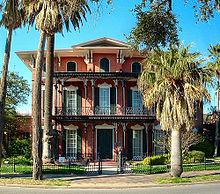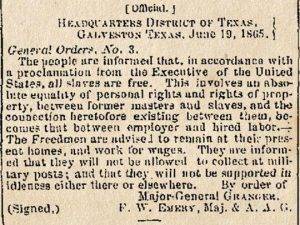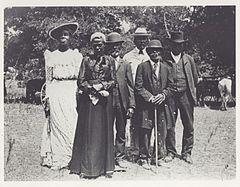Blacks and Texas Politics
Did you know?
Since Republicans became the statewide majority in 1994, eight minority Texans have held statewide office; yet in the 122 years that the Democrats controlled the State (1872-1994), only four minority Texans held statewide office.
The Texas Republican Party was formed on July 4, 1867, in Houston by 150 black and 20 white Texans.
Two of the first three statewide leaders of the Republican Party of Texas were black.
The first 42 blacks elected to the Texas Legislature were Republicans.
When the Republicans became the majority in the Texas Legislature in 1869, they established a system of free public schools to educate all the children of the State — something Democrats had refused to do.
The first faith-based program was proposed in the 1870’s by black Republican Senator Matthew Gaines.
When Democrats recaptured Texas government in 1872, Democrat Governor Richard Coke’s election was described as “the restoration of white supremacy.”
President George W. Bush was the first president to appoint a black as Secretary of State (Colin Powell). He also appointede blacks as National Security Advisor (Condoleeza Rice), Sevcretary of Education (Rod Paige), and Secretary of Housing and Urban Development (Alphonso Jackson). In his second term, he appointed the second black Secretary of State (Condoleeza Rice).
With new programs established by President Bush, blacks’ home ownership is at an all-time high.
Of the 5 blacks whom have ever been U.S. Senators, 3 were Republicans.
The 13th Amendment abolished slavery passed by Congress with the support of 100% of Republican members but with only 23% of the Democrat members.
When the 14th and 15th Amendments extending civil rights and voting rights to blcks passed, not even one Democrat in Congress voted for these amendments.
Equal opportunity is a right and privilege. Texans should be able to start a business, run for office, or chase a dream, without the threat that government will punish success. Black Republicans are successful leaders in their communities and in Texas politics. The Republican Party of Texas is the political party that can best help all citizens achieve their hopes and dreams.
For more information, visit www.TexasGOP.org
Happy Juneteenth!
 When news of the Emancipation Proclaimation reached Texas
When news of the Emancipation Proclaimation reached Texas
Juneteenth is the oldest known celebration commemorating the ending of slavery in the United States. Dating back to 1865, it was on June 19th that the Union soldiers, led by Major General Gordon Granger, landed at Galveston, Texas with news that the war had ended and that the enslaved were now free.
This was two and a half years after Republican President Abraham Lincoln’s Emancipation Proclamation — which became official January 1, 1863. The Emancipation Proclamation had little impact on the Texans due to the minimal number of Union troops to enforce the new Executive Order. However, with the surrender of General Lee in April of 1865, and the arrival of General Gordon Granger’s regiment, the forces were finally strong enough to influence and overcome resistance from the Democrats running the state.
It was in Texas where slavery finally ended.
One of General Granger’s first orders of business was to read to the people of Texas, General Order Number 3 which began most significantly with:
“The people of Texas are informed that in accordance with the Proclamation from the Executive of the United States, all slaves are free. This involves an absolute equality of rights and rights of property between former masters and slaves, and the connection heretofore existing between them becomes that between employer and free laborer.”
General Granger then traveled around Texas to inform the African-Americans, still being held as slaves by their masters, that they were in fact free.
The reactions to this profound news ranged from pure shock to immediate jubilation. While many lingered to learn of this new employer to employee relationship, many left before these offers were completely off the lips of their former ‘masters’ — attesting to the varying conditions on the plantations and the realization of freedom. Even with nowhere to go, many felt that leaving the plantation would be their first grasp of freedom. North was a logical destination and for many, it represented true freedom, while the deire to reach family members in neighboring states drove some into Louisiana, Arkansas, and Oklahoma.
After Lincoln’s assassination, Democrat Andrew Johnson became President and did all wthin his power to prevent blacks from experiencing Lincoln’s new birth of freedom. Since General Granger was a zealous advocate for full civil rights for African-Americans, President Andrew Johnson relieved Granger from his command in Texas on August 6, 1865, just six weeks after his arrival. Then, he dismissed General Phil Sherman, whom had sent General Granger to Galveston, and replaced him General Winfield Hancock.
 President Andrew Johnson campaigned against ratification of the 14th Amendment and vetoed the Republicans’ Civil Rights Act of 1866. Andrew Johnson squashed Republican attempts to provide ‘forty acres and a mule’ to emancipated African Americans. Andrew Johnson vetoed a bill to extend voting rights to African Americans in the District of Colunmbia, saying he wanted a completely ‘white man’s government’
President Andrew Johnson campaigned against ratification of the 14th Amendment and vetoed the Republicans’ Civil Rights Act of 1866. Andrew Johnson squashed Republican attempts to provide ‘forty acres and a mule’ to emancipated African Americans. Andrew Johnson vetoed a bill to extend voting rights to African Americans in the District of Colunmbia, saying he wanted a completely ‘white man’s government’
Sothern Democrats exercised almost complete control over the post-Civil War South for two years after Appomattox. The Democrat state governments set-up by the Andrew Johnson administration quickly reduced blacks to near slavery with the infamous ‘black codes.’ Not until March 1867, when they attained two-thirds majorities in Congress, were Republicans able to override Johnson’s vetoes and enact their Reconstruction policies, beginning with the Reconstruction Act of 1867.
As soon as they were back in power in the southern states, Democrats closed down most of the public school systems that Republican administrations had established for blacks, as well as poor whites. Democrat-oriented terrorist organizations, such as the Klu Klux Klan and the Knights of the White Camellia, denied African Americans their right to vote. In the South, where dozens of African Americans had held elective office while Republicans were in power at the state level, the restoration of Democrat rule excluded African Americans from politics..
The celebration of June 19th was coined “Juneteenth” and grew with more participation from descendants. The Juneteenth celebration was a time for reassuring each other, for praying and gathering remaining family members. Juneteenth continued to be highly revered in Texas decades later, with many former slaves and descendants making an annual pilgrimage back to Galveston on this date. Celebrations may include parades, rodeos, street fairs, cookouts, family reunions, park parties, historical reenanctments, and/or Miss Juneteenth pageants.
In the early years, little interest existed outside the African American community in participation in the celebrations. In some cases, there was outwardly exihibited resistance by barring the use of public property for the festivities. Most of the festivities found themselves out in the rural areas around rivers and creeks that could provide for additional activities such as fishing, horseback riding, and barbecues. Often the church grounds was the site for such activities. Eventually, as African Americans became land owners, land was donated and dedicated for these festivities.
 One of the earliest documented land purchases in the name of Juneteenth was organized by Rev. Jack Yates. This fund-raising effort yielded $1000 and the purchase of Emancipation Park in Houston, Texas. In Mexia, Texas, the local Juneteenth organization purchased Booker T. Washington Park, which had become the Juneteenth celebration site in 1898. There are accounts of Juneteenth activities being interrupted and halted by whte landowners demanding that their laborers return to work. However, it seems most allowed their workers the day-off and some even made donations of food and money. For decades these annual celebrations flourished, growing continuously with each passing year. In Booker T. Washington Park, as many as 20,000 African Americans once flowed through during the course of the week, making the celebration one of the state’s largest.
One of the earliest documented land purchases in the name of Juneteenth was organized by Rev. Jack Yates. This fund-raising effort yielded $1000 and the purchase of Emancipation Park in Houston, Texas. In Mexia, Texas, the local Juneteenth organization purchased Booker T. Washington Park, which had become the Juneteenth celebration site in 1898. There are accounts of Juneteenth activities being interrupted and halted by whte landowners demanding that their laborers return to work. However, it seems most allowed their workers the day-off and some even made donations of food and money. For decades these annual celebrations flourished, growing continuously with each passing year. In Booker T. Washington Park, as many as 20,000 African Americans once flowed through during the course of the week, making the celebration one of the state’s largest.
Economic and cultural forces provided for a decline in Juneteenth activities and participants beginning in the early 1900’s. Classroom and textbook education in lieu of traditional home and family-taught practices stifled the interest of the youth due to less emphasis and detail on the activities of former slaves. Classroom text books proclaimed Lincoln’s Emancipation Proclaimation of January 1, 1863 as the date signalling the end of slavery — and little or nothing on the impact of General Granger’s arrival in Galveston on June 19th, 1865
The Depression forced many people off the farms and into the cities to find work. In these urban environments, employers were less eager to grant leaves to celebrate this date. Thus, unless June 19th fell on a weekend or holiday, there were very few participanrts available.
The Civil Rights movement of the 1950’s and 1960’s brought a resurgence in Juneteenth celebrations. The struggle for racial equality was linked to the historical struggles of their ancestors.
On January 1, 1980, Juneteenth became an official state holiday. The successful passage of this bill marked Juneteenth as the first emancipation celebration granted official state recognition.
 Juneteenth today, celebrates African American freedom and achievement, while encouraging continuous self-development and respect for all cultures, As it takes on a more national, symbolic and even global perspective, the events of 1865 in Texas are not forgotten, for all of the roots tie back to this fertile soil from which a national day of pride is growing.
Juneteenth today, celebrates African American freedom and achievement, while encouraging continuous self-development and respect for all cultures, As it takes on a more national, symbolic and even global perspective, the events of 1865 in Texas are not forgotten, for all of the roots tie back to this fertile soil from which a national day of pride is growing.
Juneteenth is intractably part of the Republican Party’s rich legacy of freedom — which defines what the Republican Party believes. The Republican Party has always been a party advancing a liberty agenda, one that promotes upward mobility through self-sufficiency. The party has always stood for limited government as demanded by our Constitution, one that promotes the liberties of our nation’s citizens, regardless of race, creed, or color.

 When news of the Emancipation Proclaimation reached Texas
When news of the Emancipation Proclaimation reached Texas